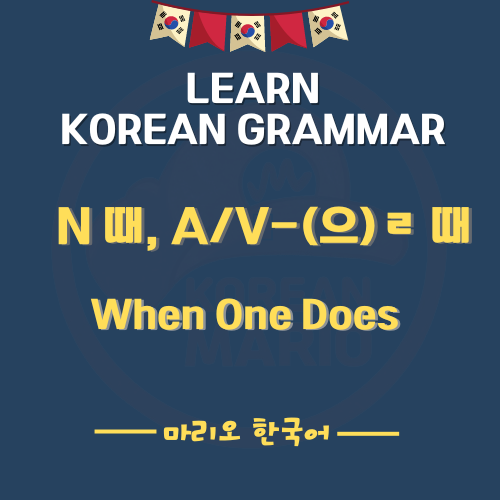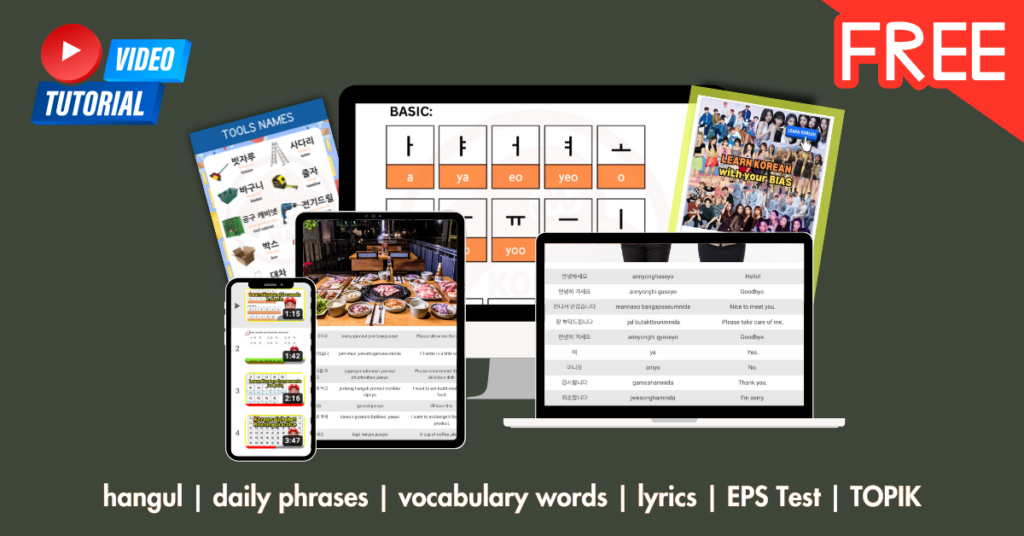
때 expresses the time when an action or state occurs or its duration.
1. When following a noun, 때 is used.
2. When following a verb or adjective, -ㄹ 때 or -을 때 is used.
Learn more daily content on Instagram!
Noun + 때
생일 때 birthday
점심 때 lunch time
크리스마스 때 christmas
7살 때 7 years old
V/A + (으)ㄹ 때
to see 보다 → 볼 때
to eat 먹다 → 먹을때
to have 있다 → 있을 때 to have
to be bad 나쁘다 → 나쁠 때 to be bad
-ㄹ 때 vs -을 때
When following a verb or adjective, -ㄹ 때 is used when the stem ends in a vowel, -을 때 is used when the stem ends in a consonant.
stem ends in vowel -ㄹ 때
만나다 → 만날 때
예쁘다 → 예쁠 때
stem ends in consonant -을 때
좋다 → 좋을 때
읽다 → 읽을 때
A/V-(으)ㄹ 때 Irregular Form
살다 (to live) → 살 때
만들다 (to make) → 만들 때
붓다 (to be swollen) → 부을 때
덥다 (to be hot) → 더울 때
More Examples
Adjectives:
- 기쁠 때 (happiness)
- 슬플 때 (sadness)
- 화날 때 (anger)
- 행복할 때 (joy)
- 지루할 때 (boredom)
- 무서울 때 (fear)
- 답답할 때 (frustration)
- 추울 때 (coldness)
- 덥을 때 (heat)
- 재미있을 때 (fun)
- 아플 때 (pain)
- 건강할 때 (health)
- 더러울 때 (dirtiness)
- 신날 때 (excitement)
- 졸릴 때 (sleepiness)
- 불안할 때 (anxiety)
- 부끄러울 때 (embarrassment)
- 고마울 때 (gratitude)
- 설렐 때 (fluttering)
- 귀여울 때 (cuteness)
- 흥분할 때 (exhilaration)
- 조용할 때 (quietness)
Verbs:
- 먹을 때 (eating)
- 잘 때 (sleeping)
- 일어날 때 (waking up)
- 공부할 때 (studying)
- 운동할 때 (exercising)
- 읽을 때 (reading)
- 쓸 때 (writing)
- 들을 때 (listening)
- 말할 때 (speaking)
- 찾을 때 (searching)
- 볼 때 (watching)
- 놀 때 (playing)
- 걸을 때 (walking)
- 달릴 때 (running)
- 쓸 때 (using)
- 사랑할 때 (loving)
- 울 때 (crying)
- 웃을 때 (laughing)
- 기다릴 때 (waiting)
- 탈출할 때 (escaping)
- 생각할 때 (thinking)
- 기다릴 때 (waiting)
- 미안할 때 (apologizing)
These examples cover a range of adjectives and verbs using “-ㄹ 때” and “-을 때” to express various conditions, actions, and emotions in Korean.
- 나는 공부할 때 집중력이 높아요. (I concentrate well when I study.)
- 그는 운동할 때 건강해져요. (He gets healthier when he exercises.)
- 여행할 때 새로운 경험을 해요. (We experience new things when we travel.)
- 나는 책을 읽을 때 시간이 빨리 가요. (Time flies when I read.)
- 그는 춤출 때 행복해 보여요. (He looks happy when he dances.)
- 우리는 음악을 들을 때 함께 춤을 춰요. (We dance together when we listen to music.)
- 나는 운전할 때 집에 가고 싶어져요. (I want to go home when I drive.)
- 나는 산책할 때 마음이 편안해져요. (I feel relaxed when I take a walk.)
- 나는 수영할 때 스트레스가 풀려요. (I relieve stress when I swim.)
- 우리는 휴가를 갈 때마다 서로를 더 잘 알게 돼요. (We get to know each other better every time we go on vacation.)
- 그는 축구를 할 때 신체적인 능력을 키워요. (He enhances his physical abilities when he plays soccer.)
- 나는 여행을 갈 때 새로운 사람들을 만나고 싶어져요. (I want to meet new people when I travel.)
- 그들은 토론을 할 때 항상 의견을 공유해요. (They always share their opinions when they debate.)
- 나는 잠을 잘 때 꿈을 자주 꾸는 편이에요. (I often dream when I sleep well.)
- 그는 노래를 부를 때 감정을 표현해요. (He expresses emotions when he sings.)
A: 몇 살 때 결혼을 했어요? How old were you married?
B: 30살 때 결혼을 했어요. I got married when I was 30.
A: 이 시계를 언제 샀어요? When did you buy this watch?
B: 크리스마스 때 선물로 받았어요. I got it as a gift on Christmas.
A: 케익이 너무 달아요. This cake is too sweet.
B: 만들 때 설탕을 너무 많이 넣었어요. I put too much sugar when I made it.
Quick Tip
때 cannot be used together with a few exceptions: 오전, 오후, 아침, or the days of the week 요일.
오전 때 비빔방을 먹었어요. (X)
오전에 비빔방을 먹었어요. (O)
I had bibimbap in the morning.
오후 때 공부해요. (X)
오후에 공부해요. (O)
I study in the afternoon.
일요일 때 고향에 가요. (X)
일요일에 고향에 가요. (O)
I’m going to my hometown on Sunday.
Learn Korean With More Blogs

- EPS Free Course Learn with BTSNumbers and WordsTravel and Daily KoreanTOPIKHangul – The Korean AlphabetsBeginner GrammarIntermediate GrammarTools Names
Table of Contents

